ONE DAY IN THE LIFE OF VICKI VIIDIKAS
By Stephen Oliver
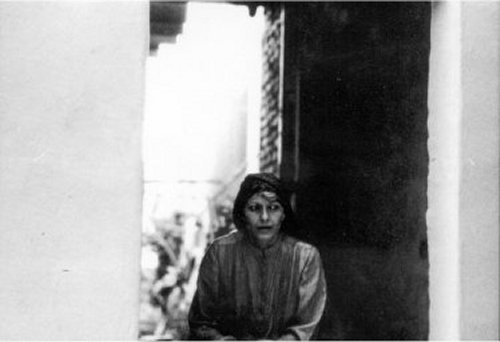
[Above] Vicki Viidikas: Inward Journey to taste the spirit's dark liquor (Photo courtesy of Hale & Iremonger)
Jesus said, "If one blind person leads another blind person,
both of them will fall into a hole." - The Gospel of Thomas: saying 34
A sharp deflection of the gin-glass slashed across my knuckles. Four little red crescents. Four neat, upturned cuts bright as smiles. The day had started out as these things do - pleasantly enough, in a couple of the Newtown pubs; The Courthouse, corner Lennox and Australia Streets, then steadied at the Sandringham Hotel, past the Newtown train station, at the Erskineville end of King Street. The incident took place in the early evening at a 'boutiqued' working man's cottage in the gentrified, middle-class suburb of Balmain. This was home to one of the middling 'beat' mandarins of the '60s generation who had never left the area. The year was 1988, three years into my seven year tenure in Newtown. Somewhere, it was the end of an era for somebody. Still young enough to risk my balance, I had not yet reached forty. I felt like a man upright and cruciform, arms outstretched, on the roof carriage of an express train hell-bent. Like Jon Voight in the 1985 movie, Runaway Train - hurtling headlong into the blizzard and oblivion.
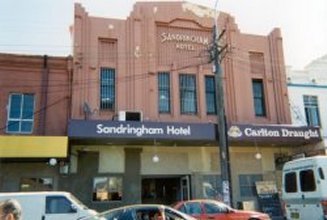
|
An image projected by ultra-sound (as if onto a besmirched windscreen) eerily resembles the image transmitted by a weather satellite - it is dependent on withdrawal and perspective. And as I look back upon those days living in the inner-west suburb of Newtown, I observe another person caught up in the blur and distortion of a street-wise community operating frenetically in a closed and 'islanded' space; vertiginous, but confined of movement. This choice on my part was more by accident than design (effectively, my first flat in Sydney) a life led close to the edge, yet somehow remaining apart from it; ebb and flow, a balancing act. |
[Above] Sandringham Hotel: confused poetry readings, Newtown, Sydney (Photo by Stephen Oliver, 2001)
I chose engagement with minimal compromise, not an easy line to hold against a working-class youth culture who played uncompromisingly by their own rules. Loyalty belonged to immediate and often temporary involvement - mateship, that great democratic lie lodged comfortably in the Australian male psyche, was, I soon discovered, illusory and skin deep. Or as I wrote elsewhere, - which is probably more applicable to the prevarications of a Police Tribunal than the average citizen, "Corruption is Glorified Mateship".
So it went. If you were out of sight you were out of mind. Allegiances were made and broken on the toss of a coin - or throw of a fist. Bravado, not friendship, was the name of the game around the pumping undulations of King Street, Newtown. This was the typical urban environment in which the average male acquired the pack-instinct, the easy lie of camaraderie. Anyhow, the few old inner suburban working-class hotels that had thus far escaped 'boutiquing' back then (aside from viral spread of pokies) could be found in the Camperdown backstreets. Like the Royal Edward Hotel (the pub's now gone but the building remains) on the corner of Wilson and Forbes Streets, Newtown, though you wouldn't normally frequent the joint, haunted as it was, supposedly, by a double murder that took place on the premises in the mid '70s. One of the principal locations in the early days (though by late 1987, I was 'banned for life' having called the proprietor - a backyard bully given to beating up on his customers - a fascist) was the Carlisle Castle Hotel, in Albermarle Street, Camperdown. I lived in a small block of red-brick units on Chelmsford Street situated a few minutes walk away.
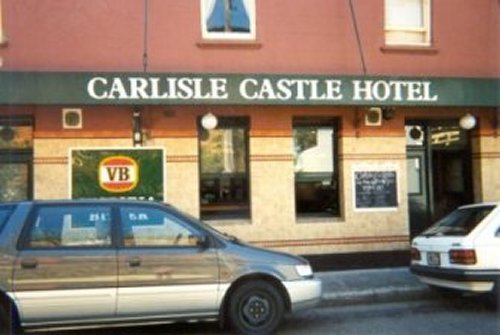
[Above] Carlisle Castle Hotel: a Rabelaisian democracy, Camperdown, Sydney (Photo by Stephen Oliver, 2001)
The pub catered to the standard contingent, the front bar with its handful of old timers and long-haul drinkers, yellow-cab couriers and short-tempered security men (for fifty bucks you could hire a standover man), and a clutch of blue collar workers - while the back bar, which gave access to a bare room set aside for pool tables, attracted the local grunge element, a few Sydney University students, welfare recipients, minor public servants from government departments (looking for an identity) and generally, the requisite agitating core of speed freaks, loners, downright shifty dudes and blow-ins. A Rabelaisian democracy, the usual suspects and standard cliques. To me the establishment always generated an edgy 'vibe' and that probably had as much to do with my paranoia as anything else. I actually felt like a foreigner smuggled into the camp.
If you got landed with a nickname, this pretty much represented a measure of provisional acceptance. Somehow, 'the poet' didn't quite cut it with that crowd for long. If this cognomen suggested exclusivity, I couldn't have agreed more. It didn't have quite the same ring to it as 'Two-Bob Pete' or 'Have-A-Chat ...' As a regular socializing venue, this was a clumsy miscalculation on my part. It proved entirely the wrong choice in anonymity. Nevertheless, there was no shortage of drinking partners, and you could always find a bar-stool to sit at, conversation and banter in varying degrees of intensity. Expectation lay no more than an easy walk and public bar away.
The Marlborough Hotel on the corner of King Street and Missenden Road (taking care to avoid the seriously busy Oxford Tavern with wall-to-wall 'ferals and goths') offered a greater crush and diversity. Newtown, gateway to the west, from the mid '80s was undergoing a sociological shift. Various musicians, artists and poets had taken up residence (John Forbes in Lennox Street, Martin Harrison in Denison Street, myself in Chelmsford Street - practically living on the same block, though interceptions, as if by sleight-of-hand, were rare) because of the cheap rental accommodation and accessibility to the CBD. By now the gay contingent had invaded the real estate market, and inexpensive Thai restaurants had started to open up one after the other (with adventurous names like Thai Tanic) along the King Street shopping strip.
At one stage I counted at least fifteen Thai restaurants within a two hundred yard stretch. Newtown had always accommodated Greek, Lebanese and Turkish communities, along with the Yugoslavs and their tucked-away gambling rooms. Earlier still in the '60s, the neighbourhood became home to a considerable Samoan population; a shifting demographic underscored by the founding Anglo-Celtic working class culture who originally established and defined the inner west. Around Enmore you might yet discover a narrow doorway and worn wooden stairs leading up to an unadorned though comfortable room full of serious gamblers. As long as you kept your mouth shut, you could stay and enjoy the spicy, pitch-black coffee. A number of the ethnic restaurants in Enmore road offered Turkish belly-dancing. Greek and Albanian women sang in spiralling Moorish or Arabian accents and circulated amongst the diners collecting tips after their performances.
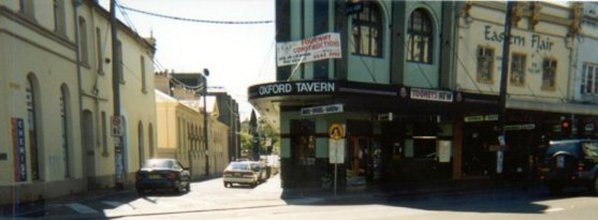
[Above] Oxford Tavern, Newtown: haunt of goths & ferals, Newtown, Sydney (Photo by Stephen Oliver, 2001)
This then was largely the purlieu I circulated in during those days. Newtown became an island unto itself. Yet I can't recall precisely when I first met Vicki, it might been at a poetry reading sponsored by the Goethe Institute in Woollahra, and organized through the Austrian poet/playwright, Rudi Krausmann, or an introduction made at the Rose & Crown Hotel in Paddington, a local frequented by the poet, Bob Adamson. Both he and Rudi lived in the district up until the close of the decade. They were long-time associates in varying degrees of friendship with Vicki Viidikas, going right back to the early days of the Wild & Woolley Press, a small independent, relatively successful publisher of poetry. But this was long before I arrived on the scene. I landed in Sydney in 1986 (on the eve of a recession) though I had previously visited for a couple of weeks back in late December of 1978, on my way through to the Mediterranean and the island of Crete.
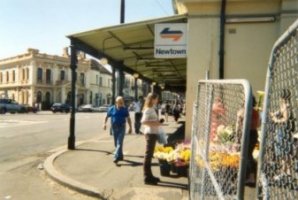 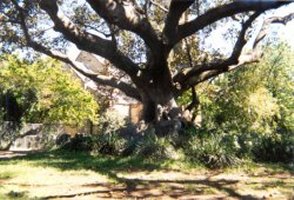
[Above Left] Newtown: an island unto itself, Newtown, Sydney (Photo by Stephen Oliver, 2001) [Above Right] Shelter for many a late night
gathering, Newtown, Sydney (Photo by Stephen Oliver, 2001)
My intention the second time around (a hurried escape from Auckland) was to make money quickly over a two year period selling my 'voice' to the advertising industry, and return to New Zealand with the loot to buy a house. A place of one's own - a place to write, and be left alone to do it. Naturally, things didn't quite work out that way. However, I eventually got my 'break', though it took five years to reach that point. I landed a two-year period of 'voice work' with a commercial television station which involved little more than an hour a day (or less) voicing promos for a 'current affairs' program. This gave me what I desperately wanted - however, the emotional climate of my lifestyle was such that the money simply gave me much needed breathing room; respite from poverty which had dogged me relentlessly up until then. I knew that this good fortune wouldn't last (such is the nature of freelance work) but at least, it gave me the chance to get out - and move to Melbourne for a couple of years and centre myself. But that came five years further on down the track when I had grown roundly sick of Newtown's gritty lifestyle, and five years after the incident that I am relating here passed into history. I lived seven years in that one unit. Newtown baked as if on an oven plate in the hot summer months, dust and grime filtered in from across the dreary factory lands extending out west, to leave the place parched and airless.
I do, however, clearly recall my second meeting with Vicki (the same clarity that precedes an accident - frozen forever in time) after perhaps an absence of a year or so, and the events of that day which are the subject of this short memoir. O Newtown, dark womb of Sydney! Early 1988: Vicki was sitting outside an Asian takeaway in King Street, eating rice from a plastic container, so delicately with her fingers. She had pretended that she hadn't seen me in order to act fittingly surprised when I greeted her.
For a moment, I hesitated, and almost walked by. Yet - I think her pretence at not noticing gave me that momentary choice. But there was something about the delicacy of her fingers which stopped me. She looked like a frail, abandoned bird. I think she may have stayed at my one bedroom apartment that night - and a couple of days later, we caught up at the Sandringham Hotel for one of the confused poetry readings they ran in those days, prior to the band starting up on a Saturday afternoon.
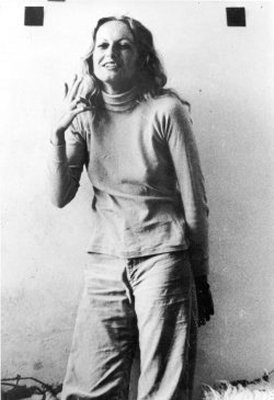
|
Of the afternoon itself, there is not much to relate. We continued on into the early evening and returned to my 'studio' apartment in Chelmsford Street.’ We commandeered a ride with an upstairs neighbour who now joined the party, 'the boy from Gippsland', over to Balmain and the house of the 'beat' mandarin, about ten minutes drive away.
Thankfully, he was not in residence at the time. Conveniently, I knew one or two of his New Zealand house guests. We continued to grog on steadily, getting into the groove - and entertain on the strength of this rather tenuous association. A couple of hours drifted by in that fashion.
It was then (though I can't recall in what context) that I asked Vicki, - was it true that she had at some time married an Aborigine (I'd heard she had, and I was simply interested) - which precipitated a sudden and unabated blind fury on her part (I didn't realise at the time it was junkie fury) where she hurled, with deadly force and velocity, a full glass of gin straight at my face. The frail bird had transformed itself into a raptor. Pure reflex saved me, for the glass surely would have found its intended mark and more than likely blinded me. |
[Above] Vicki Viidikas: The abandoned child destined never to be accepted (Photo by photographer unknown, year unknown)
While I was dealing with this, she suddenly had the 'beat' mandarin's Olivetti portable typewriter clasped in both talons, held high above her in a somewhat Old Testament, avenging stance - momentarily poised, ready to dash the thing on my head! No way could I have deflected that. Maybe the sight of blood streaming from my slashed knuckles - or that her wrath on this occasion, suddenly ceased as quickly as it came before she had a chance to cause greater damage, saved the situation. At any rate, the stunned guests managed to somehow placate her, at least long enough for her pathological fury to cool. We managed to drive to the Royal Prince Alfred Hospital, my hand wrapped in a blood-soaked tea towel, situated back in Missenden Road. I got an injection stabbed into my wounds, viciously pulled open by a sadistic Irish nurse, and finally, a pretty row of stitches for my trouble. The evening tailed out over a few apologetic drinks once more, in a 360 degree sweep, back at the Sandringham Hotel. The dazed, and slowed comfort of exhaustion. For a moment the planet had stalled. What the hell was I doing in this neighbourhood - leading this life?
A few weeks later there was a compounding incident involving her new junkie boyfriend or co-conspirator, a thug bikie; a hair-raising ride on the back of his motorcycle to Eastlakes off Gardeners Road past Rosebery, where she had found free accommodation with Rudi Krausmann's ex-wife in a Housing Commission Block; and a threatening incident involving a monkey wrench. At that point, I decided the woman was disaster incarnate and I refused outright to have anything further to do with her. And finally, there was a residue meeting of sorts at my place, but that too deteriorated into a drunken shambles, and I kicked her out into the wet and wintry night around 3 a.m. in the morning.
This was the summary of events which precipitated the poem (see below) freighted as it is with cross-currents of pleading for acceptance, guilt, and anger at rejection. The graveyard she refers to in her poem is Camperdown Cemetery, attached to St Stephen's Church, distinguished by its age and a few notable occupants (the Wreck of the Dunbar memorial site with its giant, rusted anchor, Sydney's first Mayor, the raffish 19th century lyre player, Nicholas Charles Bochsa, rumoured to have been poisoned by agents of Napoleon III's regime, and the woman upon whom Charles Dickens purportedly modelled his character, 'Miss Havisham', in the novel, Great Expectations, et al). One monstrous Moreton Bay Fig (shelter for many a late-night gathering) overhangs the wrought-iron gateway to the old cemetery.
Anyhow, the poem which concludes this account was placed in my letter box not long after this last, frayed interception. In essence, I originally saw Vicki as a special, gifted individual possessed of a large heart. Her reputation had gone before her. I had heard about Vicki through a New Zealand poet and collage artist who had lived in Sydney during the '60s and '70s. John Goodall a.k.a. John McNamara, himself a hell-raiser known to the Balmain literary fraternity of the day, and something of a legend in his own right - a close associate of Dorothy Hewitt, Bob Adamson, and that whole incestuous scene. Dorothy, in fact, had taken a title from one of John's collage works, 'Alice in Wormland', as her own for a volume of poetry published in the late '80s. The one book produced by John Goodall called, The Savages, Poems 1964 - 1978, Señor Press, pub. 1979. is now considered a collector's item. Interestingly, the typesetting was done by Lyn Tranter. John, without warning or giving notice, surreptitiously scarpered back into the backblocks of Auckland around 1980.
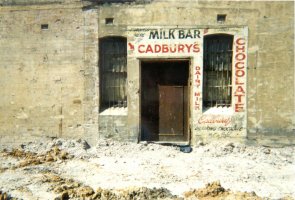 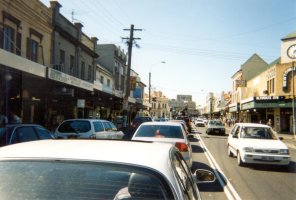
[Above Left] '50s facade exposed: demolition site, Camperdown, Sydney. (Photo by Stephen Oliver, 2001) [Above Right] Pumping undulations of King Street, Newtown, Sydney. (Photo by Stephen Oliver, 2001)
I subsequently experienced and witnessed first hand, as many others have, the blind and unabated fury of the hopeless junkie, the complete destruction of the individual. These creatures ultimately became little more than the walking dead, completely stripped of the last vestiges of humanity. As I have suggested elsewhere, one is tempted to conclude that they have unequivocally forfeited their right to humanity because they have ceased to be human. Sadly, I can see no saving grace for heroin addiction this side of the grave. The victims all follow the same boring, predictable and totally nihilistic path. To be quite frank, they are completely anathema and beyond the reach of compromise. Politically correct notions of 'shooting galleries' for instance, are futile. Such 'comforting' gestures are merely designed to assuage middle class ruminations of collective guilt. Junkies, as an 'occasional' user once told me, "like their rooms close", They will shoot up anywhere - a garage, park, an alleyway, it just doesn't matter - and they don't need an officially sanctioned club in which to do it.
These laboured compromises represent society's complete inability to come to terms with its own self-plundering consumerism. Addiction is no more nor less than the sinister side of the same appetite that goads us onto greater acquisition in our relentless pursuit for more of what we already have. A negative drive increasingly popularized in labels like Macsumerism. Even a sense of irretrievable loss can be reduced to a playful brand name. If the devil walked this earth in human form today he would do so as an economist. Junkies are the black bile of that selfsame greed, a sign that we are being eaten from the inside out. As a state of mind-numbness, this self-serving paranoia leads us down a blind to where (we think) analytical declensions can finally assume the functions of hard-wired realities. The introspective world of the self blurs onto lurid vistas of half-realized desires - directionless in their appetites and perpetuated by them. Some call this circular 'panic' living in the modern world. But that person is never the person you imagine you are dealing with; communication ossifies, becomes synonymous with entrapment.
Vicki sought shadows without restraint in a relentlessly harsh, bright land. She made that inward journey to taste the spirit's dark liquor. Fundamentally, her soul dreamt of birch forested hills endlessly stretching toward horizons, thick as the backs of wolves. The innocent failures and miscalculations of ordinary people made her laugh and easily engage. Her warmth displayed itself in an ingenuous enjoyment of the charade that is, at base, everyday life. In the end, however, heroin overpowered her, travelling back and forth to India for cheap junk, reduced (yet the sub-continent and Asia deeply attracted and inspired her) and ultimately destroyed her so that, quarantined within that hopeless addiction, she dragged the chains of destruction behind her, and became pariah to everyone she met. In the end no one wanted to know her, and that included me. You got the impression that she had out-stayed her welcome in other people's lives and haunted, rather than lived on this planet. So it is with the terminal junkie. She had retreated, or something had passed her by.
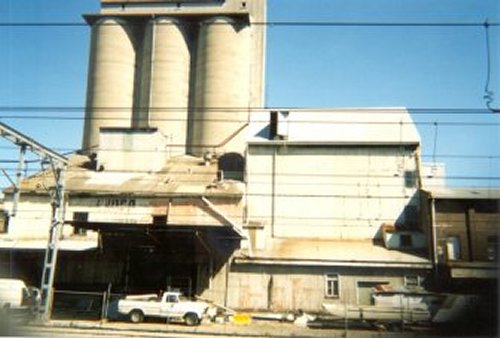
[Above] Stock and Grain Silos: overlooking Newtown rail-line, Sydney (Photo by Stephen Oliver, 2001)
Vicki was by birth a genuine talent; and without doubt would have become one of the finest poets to emerge from the '60s youth culture here in Australia. Her prodigious output was, nevertheless, largely undisciplined but undeniably original. She had a true honesty that few of her peer-group possessed, for she carried something broad and antique in a vision uniquely hers and, by all counts, closer in style and emphasis to the Russian poets of the '20s and '30s, than to the conversational mimicries of the 50s and '60s American poets. Though much of her later writing (particularly the last collection, India Ink, Hale and Iremonger, 1984) centres on her travels throughout South East Asia and the sub-continent - the spiritual tenor and emotional slant of her work strongly registers that of certain Russian poets of the early 20th century. Her genetic disposition leaned more toward, for instance, the linguistic dynamism of Velemir Khllebnikov, Vladimar Mayakovsky and Marina Tsvetayeva, than correspondingly, Sylvia Plath, Ginsberg (though his influence was unavoidable for those caught in the endless summer of the illusory '60s) Ashbery, and Frank O'Hara, or alternately, the San Francisco group.
In Australia, she had as much right to membership of the so-called group, Generation of 1968 (a boy's own adventure story) as John Tranter, John Forbes, Ken Bolton, Martin Johnston, et al., never truly defined as a coherent school of poetic endeavour (for that, you need to go back to a group of Spanish intellectuals and poets who revitalized Spanish culture and rediscovered its great heritage known as the Generation of 1898 - whose members included Unamuno, Azorín, Machado, Baroja and Valle-Inclán) bound by an artistic manifesto like, for instance, the early 20th century Symbolists, Acmeists, or Imagists - this was merely a loose confederation of local competitors, around about the same age, provincial and imitative in their Americanisms, who happened to vaguely share similar drinking habits and literary enthusiasms. As amorphous as the earlier 'Sydney Push'.
Deprived of any living history in the deeper, European sense - most of our better artistic endeavours succeeded as competent secondhand models short on originality and honesty - if by honesty you mean the unequivocal admission of cultural and individual shortcomings. Self-conscious, imitative models at best. A shared and universal immediacy was to be found in the urban, American environment, especially in the architectonics of John Ashbery - an elegance romanced to the point of stylistic anonymity - and in the musical, conversational tonality of Frank O'Hara.
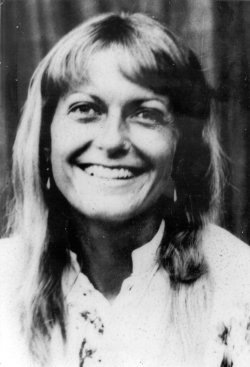
|
How could anything truly outstanding emerge from a system of disposable values which is, in effect, what the '60s was - a nostalgia for the new. And the bland shall inherit the earth and become the new status quo. How could it be otherwise? As individuals, the so-called 'Generation of '68', and other groups like it (the same label applies to the corresponding number in New Zealand) were more likely to be unified by petty dislikes, prestige and 'sexual pedigrees', by the city in which you lived with its inherent rivalries, than by anything as vital as a collective vision.
Originality became confused with novelty; spontaneity with lack of discipline; and casual conversational technique passed itself off as innovative poetic form. These unfreedoms of expression we now see at base - as little more than the spin off - of an easy consumerism in an Age of Comparative Innocence, under the guiding star of youthful exuberance, passing on into the land of rock 'n' roll to announce nothing more heroic than the Age of Multi-Media.
And now, entering upon the new millennium, what has become our inheritance? |
[Above] Vicki Viidikas: a vision uniquely hers (Photo by unknown photographer, unknown year)
We shelter under the free trade umbrella of globalization (the weak shall be made weaker, the strong, stronger; yet what worthwhile alternative can we offer in a desperately depleted environment beyond rear-guard action of damage control?) which President Bush the Younger intends to protect with a 'defence shield'.
The American way pushes on into the last great unconquered, economic wilderness that is China (by implication, further closing down Russia to third world status) with an eye to the sub-continent and India, into Indonesia but not without, one suspects, a possible redeployment in the form of further disruption to the populace, and involuntary migrations of refugees to the wealthier, western-style economies. The greater Pacific by its very nature is diffuse and small, dependant island-states present little challenge and even less threat. American aid in exchange for long range missile bases remains an option as part of the projected 'defence shield' strategy. Meanwhile, it is a matter of setting up a free-trade stranglehold in a pincer movement around the middle-east. Globalization means compulsory membership of trade blocks. We can see it now, all that hoopla and experimentation of the '60s 'counter-culture' was a small tremor within this entire, and evolving, process. The workings of a contributing consumerism, in other words. We did not possess the perspective on a greater historical process, or the vision to see what had arrived. Duped by a sneak attack.
There never was any revolution - only hedonism made public which fed the fashion industry, created a few bad dance fads and mock-pioneering communities, and an even cheaper, popular music culture. Hits twenty years hence destined to become the stuff of commercial jiggles -"like a rolling stone / Austral paving bricks." "Snap! Crackle! Pop!"/ quoth the poet. The open road may have beckoned, but offered little more than a retreating sunset, the death throes of a moribund pioneering spirit hankering after a lost agrarian existence. No matter how fast the youth culture moved, or how far out, the suburbs had got there before them. After all, a road leads somewhere. Rightly, we are not alone - so what it comes down to in the end is - you and me, the mortgage, and inevitable retrenchment. What we do have in common, though, is our collective sense of boredom, vertigo, and increasingly - displacement.
Vicki Viidikas was just one more victim, a casualty of her generation. She may have knocked repeatedly on that door [Generation of '68] seeking acceptance, but by the time it was grudgingly opened an inch or two (even then in the poetic grand stakes, women were mostly relegated to the role of party objects) she had disappeared back onto the streets. She was not one of those imitators of the American schools who became the very establishment they sought to change. Unlike many of her literary peers, she was not governed by cold-hearted careerist ambitions, nor by a cowardice of spirit. Unlike many of her generation, she was not one of those who risked nothing in the quest to gain everything; and she was not crippled by petty rivalries and fear.
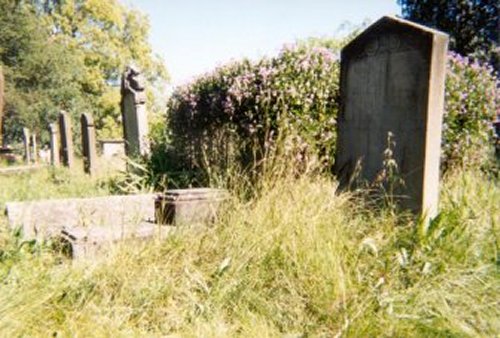
[Above] A few notable occupants: Camperdown cemetery est., 1845, Camperdown, Sydney (Photo by Stephen Oliver, 2001)
Unlike a number of her colleagues, she was not dispossessed of that generosity of spirit which reveals itself in a small, mean talent. Vicki Viidikas was alert to the inherited histories that rose and fell in her Estonian soul with all the pull of primal, migratory tides. What is it any one of us truly recalls? If conflict is the glue of history, it comes by way of a slow-burning revelation: we are as a sentient species caught in the glare of consciousness, afraid - suspecting that this 'awareness' is not our own, but the infiltration of an other; that it is we who are under surveillance - made all the more vigilant because of it. The will to destruction unfolds before the emerging shock - that throughout most of our lives we have played host to an inner, corrosive spy, suspicion.
It is reasonable to assume the darker currents of historical memory flashed across her psyche, and that she gave automatic and uninhibited expression to them. In many ways, her life had become anachronistic, indeed, she did not have any 'defence shield'. She did not compromise herself as either 'product' (she wouldn't have really understood the term as applied to poetry) or become whore to publicity and the image machine like one or two professional 'survivors' in the poetry trade. It is not too harsh a thing to say that she was the abandoned child destined never to be accepted, and she knew it. The following unpublished poem, carefully typed out on two A4 sheets of paper, and placed in my letter box, was addressed to me by Vicki Viidikas as some sort of peace offering - or so she subsequently told me.
Vicki Viidikas died on November 27, 1998. After her death I offered this poem to the poetry editor of Overland (though I did not include a copy of the poem in my offer) but this was flatly rejected. I noted that some time later, Shelton Lea published a commemorative and generous piece in the above magazine: Vicki Viidikas - Spare Angel [154.83]. There were also two significant obituary notices strongly supportive of her work; Michael Wilding's eloquent tribute in The Australian [11.12.98] and Gig Ryan's tough and comprehensive piece in The Age [12.2.99], both pleading convincingly for a reappraisal of her work, though the latter I felt, in part appropriated Vicki's shade in the interests of feminism. She was aggressively non-partisan, an individual who freely functioned beyond any political agenda. Her life was one of direct action and reaction - and as ungovernable as that.
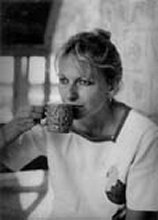
|
In all fairness, the Australian literary establishment of the late '60s and '70s did open their arms to her - success was there for the taking. Increasingly though, she chose the path of self-destruction, and as heroin addiction tightened its grip on her life, she became marginalized and opportunities evaporated.
Nonetheless, both of these obituaries note the early praise given her books of poetry, and quote the distinguished writer, Christina Stead, who said earlier, "As for V.V. her portraits of men, instant and sharp, could only have been done by a girl who took these chances [and had talent.] She has tremendous talent".
One can only ask of her enlightened and influential literary associates that they take time out from more pressing, careerist engagements to see into publication the remainder of her unpublished works. As it stands, Vicki's literary reputation is relegated to that of an interesting footnote on a talented generation that had its flowering in the 70s. |
[Above] Vicki Viidakis: not crippled by petty rivalries and fear (Photo courtesy of Pat Woolley from Wild and Woolley)
Friendship, like loyalty, demands the preservation of memory. Regrettably, the rational processes of globalization, and the strict profit margins set by transnational publishing giants, do not make it any easier for the few remaining independent publishers to rescue her reputation. That includes any other genuine poet shut out for one reason or another, condemned to subside into the lime-pit of indifference, there to become indistinguishable from the fraudulent.
New fashions guarantee oblivion for some, and youth, like ambition, is an inexhaustible resource for which there is endless demand. As far as any redress goes since her death, we have been treated to an enduring silence and leaden echo (with the rare exception) from her earliest, and closest literary associates of the '60s. Doubtless, Vicki shared a sustained commitment and dedication to the craft of writing with any number of her fellow practitioners. Philip Larkin gave us his view of that generation in his poem and book of the same name, High Windows: 'And everyone young going down the long slide / To happiness, endlessly'. Not everyone, as it turns out.
This prose poem, rather baldly titled: For Stephen Oliver, New Zealand Poet, is signed in Vicki's hand and dated, 9.4.88. I believe I am the sole recipient of this weirdly elegaic poem, and possess the original text. Indeed, I would be very surprised if Vicki ever bothered, during the chaos of those troubling days, to make a copy of the work, though many of her papers have been lodged with the Australian Defence Force Academy. Whatever 'uncomfortable' sentiments are expressed in this poem concerning my person, they are addressed to an earlier, confrontational self. The paranoia that is part of the New Zealand psyche has dissipated somewhat. Regardless, I am, as they say, prepared to 'cop it sweet':
FOR STEPHEN OLIVER, NEW ZEALAND POET
All that wonderful verbiage
of blue and glinting waters, the South Pacific, Vanuatu, skies like
old overcoats cutting the dribble of a typical Australian pub - loud,
aggressive, ego of rock 'n' roll band, musicians playing on the bar,
your mad laugh rising above the racket, rising more, more - You will not
be silent, do penance of dumbness, shut the battery of poetry off its
artillery fire.
All your talking, New Zealand poet,
forcing poems on drinkers, shouting at barmaids, cursing till no woman
wants to talk with you, not purring soft lyrics at her swan neck, not
beating time with the ramparts of your heart - Instead, you ask me to
'talk cold turkey', straight from the heart, honest, why do I trust you?
You'd be as cunning as any dingo pack, in this country of literary minors,
wimps, dressed up as roast dinners, animals, offal, their dictionaries
stuffed with trivia ...
So we drink and shove poetry books
along the bar, back and forth like wild cats, grabbing for details, a
glint in a stranger's eye, a blonde's false smile to charm your beastly
heart, an ethnic drunk who tells us poetry is obsolete - That makes you
even madder, sane as you are with conceit, 10 years to write a manuscript
but you carry no pen or paper, won't recite at any time, not prepared
for instant vision - that would foil all your writer's tools.
Loud as Hell I lunge for your throat
and want to stop the gunfire words, verbiage thick as a hedge, your B.B.C.
vanity - Who is the better poet? I won't play in your competition, damn
you for shouting about my drug habits, adding fuel to more squalid
mythology - then criticising me for being a legend in Australia. Gossip
betrays. Should I tell the authorities which poets I've been in bed with?
All that alcohol and curry and comparisons,
so sure of your talent, don't give me twelve words for your every twelve,
but boom me down, small, into argumentative bait, reaching for headache
pills - How can real poetry give you a headache? Christ, it was cold
leaving your place at 3 a.m., thrown out, savage, to shelter in a
graveyard till the rain had stopped, and public transport started at dawn.
Did you leave a lamp burning
for one honest friend who took you on pure instinct? Was it the pickled
liquor which made you turn like a snake to viciously misread me? Was it
the sound of your own voice which never finds its equal? Seriously, you
know Narcissus is stone cold, alone, talking to himself - that doesn't
fit your image, troubadour without a road ...
To think women are snares,
cunning as anacondas, waiting to crush your soul? I remember dusting
your typewriter, lending you a book, sharing cigarettes, wine, cheering
when you read, friend, of the two faced mask - Janus/Adonis, fantasy
was never my thing, but blunt reality with romantic outposts - the surreal
or gently bizarre, the subtle drop of a tongue lapping a page - Eat my
book and try to recall my touch.
Don't get me wrong, I never
threatened you with exile, encouraged you to stay, individual, pyramid
minded, devoid of greasy slaves or women with goanna mouths. I only ever
meant you the best, a little humbled perhaps, unbuttoned from memories
of cruel riptides, Kiwi banishments, nostalgia for a country too small
for your large voice.
When you disappear
into that long cloudy island, I will not follow (I prefer the tropics)
but address my letters to The Phantom of the South Pacific - I'll be
dead before you are, not sorry but silent, alone, intense as a flame
at midnight, utterly still, dreaming of the loved ones who left me,
listening for the song of a poet, carried through the ether ...
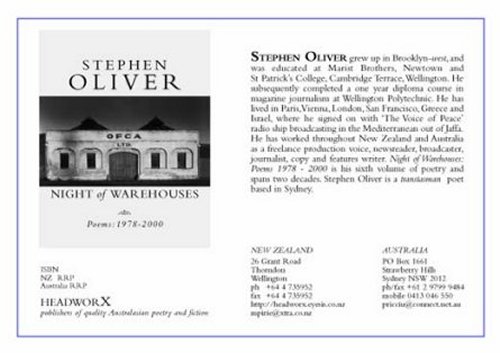
About the Writer Stephen Oliver
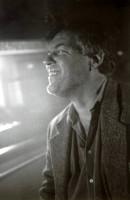
|
Stephen Oliver was born in Wellington, New Zealand in 1950 and grew up in Brooklyn-west. He was educated at Marist Brothers, Newtown and St Patrick’s College, Cambridge Terrace. He subsequently completed a one year diploma course in magazine journalism at Wellington Polytechnic. He has lived in Greece, Paris, Vienna, London, San Francisco, and Israel, where for a few weeks he worked as a broadcaster on the radio ship,‘The Voice of Peace’ in the Mediterranean out of Jaffa. He has operated in the radio and television industries as a production voice, newsreader, announcer, copy and features writer usually in a freelance capacity. Stephen Oliver is a transtasman poet based in Sydney, Australia. |
[Above] Photo of Stephen Oliver by photographer unknown, 1997.
I Next I
Back I
Exit I
Thylazine No.5 (March, 2002) |



